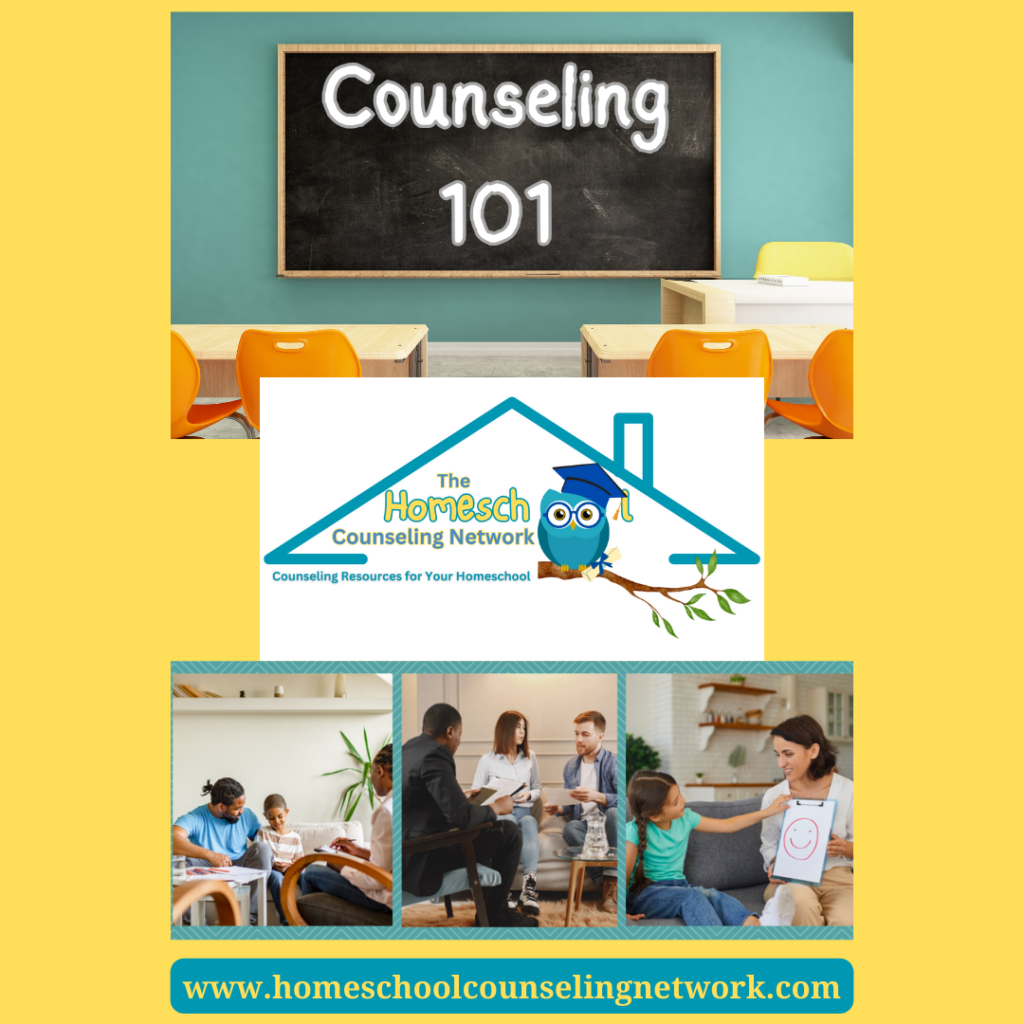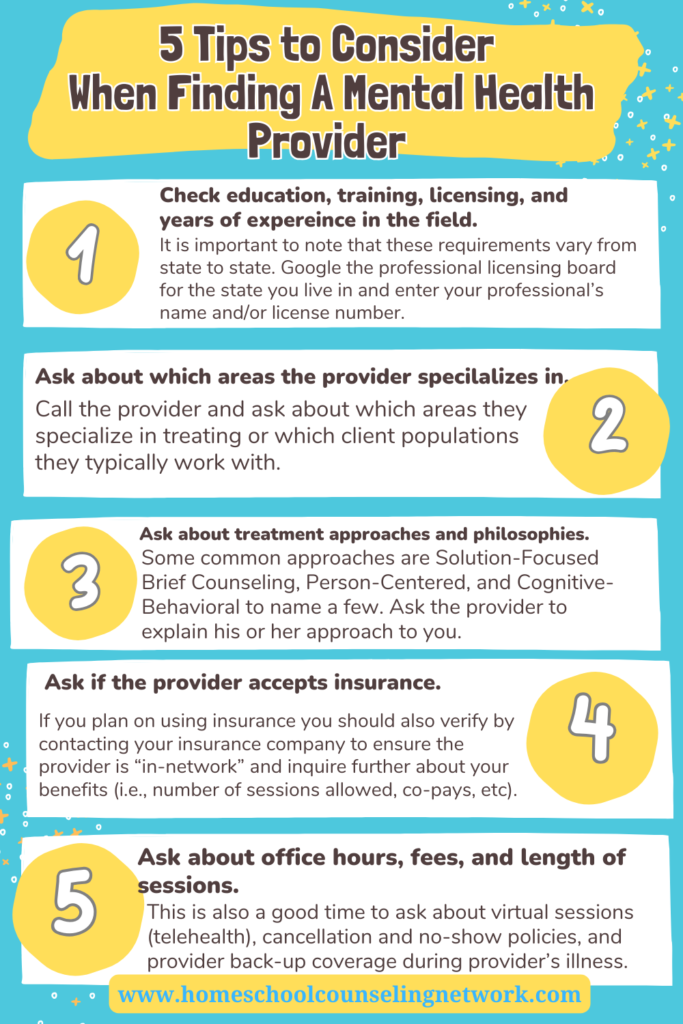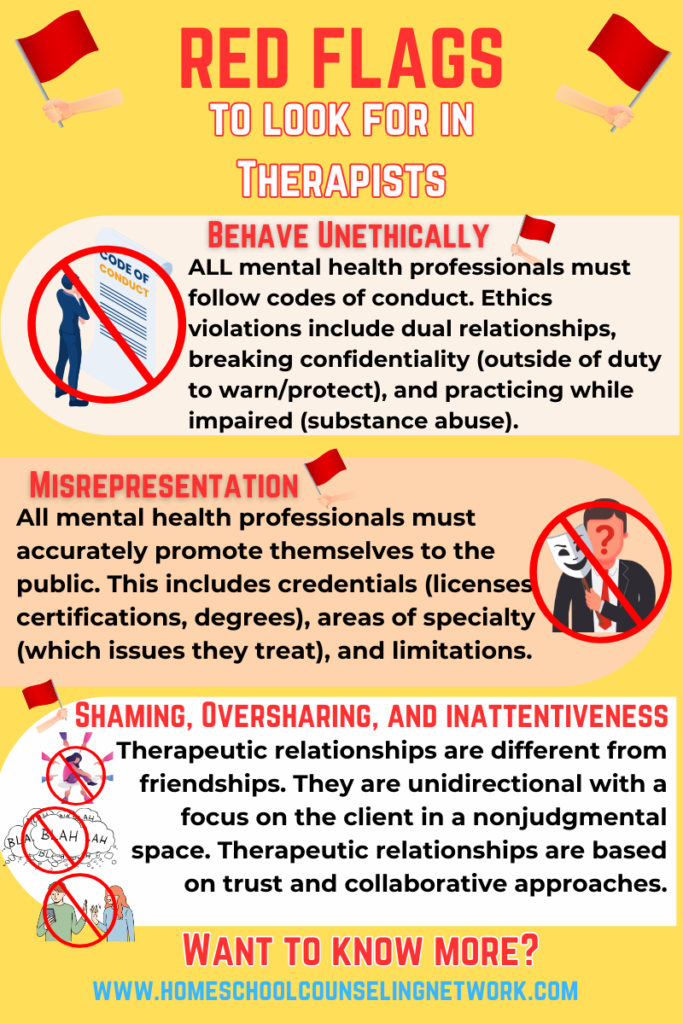Counseling 101

Professional Counseling Defined
Counseling is a professional relationship that empowers diverse individuals, families, and groups to accomplish mental health, wellness, education, and career goals.
American Counseling Association, www.counseling.org
What Is A Professional Counselor?
Professional counselors help people gain personal insights, develop strategies and come up with real solutions to the problems and challenges we all face in every area of life. As trained and credentialed professionals, they accomplish this by getting to know clients, by building safe, positive relationships and suggesting tools and techniques they believe will benefit clients.
American Counseling Association, www.counseling.org
Types of Counseling Services
Within the realm of mental health, multiple specialties and subspecialties exist depending on your professional discipline (i.e., psychology versus counseling versus social work). For reference, I have chosen to list examples from my background, professional counseling. Additional examples can be found from other professional organizations in the corresponding links below.
By population served:
- Individuals (adults, adolescents, and children)
- Couples
- Families
- Groups
Areas of specialty:
- Multicultural Counseling & Development
- Group Work
- Rehabilitation
- College Counseling
- Pediatric (Child and Adolescent)
- Geriatric and Aging
- Military Personnel/Veterans/Government
- Assessment & Research
- Creativity (Art and Music Therapies)
- Humanistic Counseling
- Spiritual, Ethical, and Religious
- Social Justice
- Resilience and Trauma Counseling
- Addictions and Offender Counseling
- Counselor Education & Supervision
- Marriage and Family Counselors
- Career Development
- Employment Counseling
- Gender Identity
**This descriptive list is not exhaustive. It is based on the American Counseling Association’s 19 Divisions. Information is for organizations and professionals licensed in the United States ONLY. For more in-depth information, please click on the links provided.
Types of Mental Health Providers
Some of these terms may be new to you if you have never received counseling or mental health services. You may also have questions about which type of professional or service best fits your needs.
Professionals in the counseling and mental health community are diverse. Providers vary greatly in terms of educational backgrounds, professional credentials, and scope of practice.
- Licensed Clinical Social Worker (L.C.S.W.) – LCSWs have earned a Master’s degree in social work at a minimum, have accrued several years of post-graduate supervision, and passed an exam as part of the requirements to earn a license to practice independently. Social workers provide a range of services including clinical evaluation, talk therapy, and other services, but are prohibited from prescribing medication. To learn more about clinical social workers, visit www.socialworkers.org
- Licensed Marriage and Family Therapist (L.M.F.T.) – Licensed Marriage and Family Therapists have also earned a Master’s degree at minimum, as well as several years of post-graduate supervision and successfully passing an exam before practicing independently. These therapists are trained in both family and individual therapy. Licensure and credential requirements for LMFTs vary by state. Please visit www.aamft.org for more information.
- Licensed Professional Counselor (L.P.C.)/Licensed Clinical Professional Counselor(L.C.P.C.)/Licensed Mental Health Counselor (L.M.H.C.) – When it comes to licensed professional counselors, titles/credentials can vary by state. Much like social workers, at a minimum, licensed counselors have earned a Master’s degree, have accrued several years of post-graduate supervision, and passed an exam as part of the requirements to earn a license to practice independently. Professional counselors also provide a range of services including clinical evaluation, identifying and diagnosing mental health disorders, talk therapy, and other services, but are prohibited from prescribing medication. To learn more about professional counselors, visit www.counseling.org
- Physician Assistant (P.A.) – a physician’s assistant may practice medicine independently providing primary care or in conjunction with a physician. P.A.s can also specialize in psychiatric care and prescribe medication. To learn more about physician assistants, visit www.aapa.org
- Psychiatrist – a physician (M.D.) who specializes in treating mental health disorders and can prescribe medication. Some psychiatrists offer talk therapy. To learn more about psychiatrists, visit www.psychiatry.org
- Psychiatric Mental Health Nurse (P.M.H.N.) – a registered nurse (R.N.) who is trained in mental health disorders. A psychiatric mental health advanced practice registered nurse (P.M.H.-A.P.R.N.) has earned, at minimum, a Master’s degree in psychiatric nursing. Other types of psychiatric care nurses include a clinical nurse specialist (C.N.S.), a nurse practitioner (N.P.), and a nurse with a doctorate in nursing practice (D.N.P.). Scopes of practice, levels of education, and ability to prescribe medication vary depending on state law. Please visit the American Psychiatric Nurses Association for more detailed information.
- Psychologist – doctoral level clinician in psychology (Psy.D. or Ph.D.). Psychologists (counseling or clinical) are trained to identify and treat a variety of mental health disorders through talk therapy. To learn more about psychologists, visit www.apa.org
- Registered Play Therapist (RPT) – A Registered Play Therapist is “a mental health professional with training and experience working with children and families through the use of play therapy” (from The University of North Texas Center for Play Therapy) At a minimum, play therapists have earned a Master’s degree in mental health with coursework in child development, personality, psychotherapy, psychopathology, and ethics. Visit the following websites for more information: www.a4pt.org, www.cpt.unt.edu/what-is-play-therapy
**This descriptive list is merely a simplistic overview. Information is for organizations and professionals licensed in the United States ONLY. For more in-depth information, please click on the links provided.
Other Types of Providers
- Addictions Counselor (formerly known as Substance Abuse Counselor) – “An addiction counselor (substance abuse counselor) helps people who have substance use disorders get treatment. They’re experts on the ins and outs of addiction and develop tailored treatment plans based on your specific addiction, needs, and goals” (from The Cleveland Clinic)
- Art Therapists (Registered Art Therapists) – “Art therapy is a mental health profession that enriches the lives of individuals, families, and communities through active art-making, creative process, applied psychological theory, and human experience within a psychotherapeutic relationship.” (from American Art Therapy Association)
- Christian Counselor – “Christian counseling integrates faith into the therapy process to promote improved mental health from a biblically-informed perspective. Christian counselors aim to address emotional suffering and dysfunction by providing compassionate support to those seeking help” (from Houston Christian University). For more information visit The American Association of Christian Counselors or The National Association of Christian Counselors.
- Educator – a person who teaches, provides instruction, or educates others; a professional educator has been certified by a state or other educational institution to teach or instruct students.
- Music Therapists – “Music therapists’ objectives are to determine and utilize music therapy approaches that effectively aid in the restoration, maintenance, and improvement of mental and physical health. Music therapists believe in the dignity and worth of every person. They promote the use of music in therapy, establish and maintain high standards in public service, and require of ourselves the utmost in ethical conduct.” (from American Music Therapy Association)
- Occupational Therapists – “Occupational therapists and occupational therapy assistants focus on the things you want and need to do in your daily life. Occupational therapy intervention uses everyday life activities (occupations) to promote health, well-being, and your ability to participate in the important activities in your life. This includes any meaningful activity that a person wants to accomplish, including taking care of yourself and your family, working, volunteering, and going to school, among many others.” (from American Occupational Therapy Association)
- Pastoral Counselor – “Pastoral Counseling is a unique and challenging career. Individuals must develop and maintain skills in two distinct areas counseling and ministry. It is a major challenge to maintain professional competence in these two unique fields” (from the National Board for Certified Pastoral Counselors). For more information, visit their website www.nbcpc.org
- Physical Therapists – “Physical therapists are licensed doctors who work with multiple patient populations impacted by disease, injury, and movement dysfunction. They optimize quality of life by maintaining, restoring, and improving patient’s ability to move, function, and live more active lifestyles.” (from American Physical Therapy Association)
- Professional Life Coach – “A life coach is a type of wellness professional who helps people make progress in their lives to attain greater fulfillment. Life coaches aid their clients in improving their relationships, careers, and day-to-day lives. Life coaches can help you clarify your goals, identify the obstacles holding you back, and then come up with strategies for overcoming each obstacle.” (from Very Well Mind)
- Rehabilitation Counselor – “Rehabilitation counselors help people with physical, mental, developmental, or emotional disabilities live independently” (U.S. Bureau of Labor Statistics)
- School Counselor – “School counselors are certified/licensed educators who improve student success for ALL students by implementing a comprehensive school counseling program” (American School Counselor Association)
- School Psychologist – “School psychologists receive specialized advanced graduate preparation that includes coursework and practical experiences relevant to both psychology and education. School psychologists typically complete either a specialist-level degree program” (from the National Association of School Psychologists). While school psychologists typically work in public or private education environments, many also work in the private sector as consultants.
- Speech Language Pathologists – “Speech-language pathologists, also SLPs, are experts in communication. SLPs work with people of all ages, from babies to adults. SLPs treat many types of communication and swallowing problems.” (the American Speech-Language-Hearing Association)
Counseling Versus Coaching
While both services are in the vein of helping others, it is important to note distinctions between the two professions.
Licensed mental health professionals, such as psychologists, psychiatrists, professional counselors, social workers, and marriage and family therapists, are trained clinicians who can treat mental health disorders. These mental health professionals complete advanced degrees, have additional training and supervision, and are credentialed in the states in which they practice.
As part of this licensure and credentialing process, professionals must also adhere to a strict code of ethics and operate within his or her trained scope of practice, as well as complete additional training known as continuing education units to maintain said licenses. Licensure criteria for each discipline may vary from state to state but operating without a license is not only unethical but also illegal.
Professional coaches, conversely, cannot treat mental health disorders, are not required to submit to any formal qualifications or academic training, and are not governed by a professional board.
However, do not discount the important role a life coach can play in helping you achieve your goals. Firstly, while it is not required to practice, many professional life coaches receive some form of training in professional coaching. Secondly, many licensed mental health professionals employ the use of coaching techniques in their professional practices as a means of helping a stabilized client accomplish a goal. Thirdly, many professional coaches have degrees and work experience in other professional backgrounds, such as nursing, health, business, law, nutrition, or education.
It is for this reason that The Homeschool Counseling Network provides a separate resource list for professional coaches.
Below are some suggested articles to further help you determine if your needs would be better met through counseling or coaching services:
Counseling vs. life coaching – Counseling Today
What Is Life Coaching? | Psychology.org
What Your Therapist’s Scope of Practice Means for You (verywellmind.com)
What Is a Life Coach? (verywellmind.com)
Performing Your Due Diligence
Before entering into any therapeutic relationship with a treating professional, it is important to perform due diligence.
HCN does not personally vet each professional who joins our network.
Instead, we endeavor to provide the homeschooling community with information about the counseling process in general, red flags to look for when considering working with a provider, and how to research a licensed professional in your home state to verify credentials.

Red Flags
When seeking care from any provider, mental health, medical, or otherwise, part of performing due diligence is educating yourself on common signs that a practitioner may not be a good fit, may be compromised as a professional, or may even be deceptive or fraudulent.

In the above graphic, we touch on three main areas for Red Flags:
- Behaving Unethically – All mental health professionals have codes of conduct and codes of ethics to adhere to as part of their professional practice. Ethical violations can look like many things. Some of the more commonly known are unwarranted breaching confidentiality (i.e., not duty to warn or protection from harm) or engaging in dual relationships (i.e., dating clients, becoming friends with clients, making sexual advances towards a client).
- Misrepresentation – All mental health professionals must accurately promote themselves and their services to the public. This includes credentials (licenses, certifications, and degrees), areas of specialty they are trained to treat (anxiety disorders, depression, trauma, pediatric or geriatric populations), and limitations. Even professionals with multiple degrees and decades of experience are not equipped to treat all areas. This is where referral networks come in.
- Shaming, Oversharing, and Inattentiveness – A therapist is not necessarily forbidden to share about his or her life with a client. Some sharing, when well-timed, and used sparingly with discernment, can strengthen the therapeutic bond and be beneficial for the client. (**NOTE: The key part of that sentence was beneficial FOR THE CLIENT.) Therapeutic relationships flow in only one direction, from the therapist to the client. Therapeutic relationships are NOT friendships. Shaming and inattentiveness are also unacceptable and inappropriate. Therapeutic relationships are collaborative efforts based on mutual trust and respect.
**This list is neither exhaustive nor comprehensive.
Important Points To Ponder
The flavor of alphabet soup that falls behind a clinician’s name is irrelevant. Whether the therapist is a social worker, a counselor, a psychologist, or a marriage and family therapist does not matter.
What matters is a strong, positive working relationship between client and clinician that is based on openness and trust. As the client, you should feel comfortable in disclosing information to your therapist and in being able to ask questions freely of your therapist or about any interventions or treatment being recommended to you, including the pros and cons of receiving or declining treatment. We call this informed consent and it means you have a right to know what you are getting yourself into before entering into a therapeutic relationship.
Therapy professionals are humans, too. While we may have undergone extensive training (and continue to do so as part of continuing education requirements to renew our professional credentials), we experience trials and tribulations in our lives, too.
Like parents, we have good days and bad. We are all worthy of grace. However, if bad days in the therapy room become routine (or are routine), it is time to let your therapist know it is affecting you. It may also be time for a new therapist.
Want to know more?
For more of my story and background, check out my debut blog post here.
Just like us, this page is always learning and always growing. Resources are updated regularly.
However, this page is not the only source of information. Be sure to check out The Homeschool Counseling Network Blog where we feature posts on all sorts of topics related to counseling and homeschooling.
Seeking advice from counseling, mental health, therapy, and educational professionals? Check out The Homeschool Counseling Network Podcast.
Be sure you do not miss a blog post by signing up for our email list, liking our Facebook, Instagram, Linked In, or Pinterest pages, or subscribing to our YouTube channel.
Like what you see here? Sharing is caring!
Blessings,
Kimberly Bennett, LPC (TX LPC #80138)
Founder/CEO, Homeschool Counseling Network Inc.

This website is not a professional counseling website and nothing here should be construed as professional counseling advice. Although Kimberly Bennett, LPC is a Licensed Professional Counselor, she is not your counselor, and no counselor-client relationship is established unless she has signed an agreement with you. All information provided through this website is for informational and educational purposes only.